|
As salaam alaykum and a Blessed Ramadan Allah tells us in the Holy Quran that “HE will not change a condition of a people unless they first change what is within themselves”(Ar-Rad 13:11). Ramadan is the best time to strive to achieve that. We abstain from food and water for 14 hours in a day, so it seems that the struggle is real, although the real struggle is the fight to battle our Nafs, (our lower desires). Ramadan comes from the root word رمض(Ramidha). This means a scorching heat. We feel this in our hunger pangs throughout the day; this burning heat, but know this is a spiritual heat meant to purify the state of the human being. This makes us ponder more on the inner- self. What can I do better? How can I continually refrain from bad character? Allah tells us “HE is not in need of us leaving off food and drink unless we leave off bad character” (Sahih-Vol 3). Sometimes some of us cannot refrain from that until we are towards the very end of the blessed month. (Hence the struggle is real). Understand that although all good deeds we do are for the benefit of our own souls, Allah said fasting is for HIM-so this is DUTY to Allah the Most High. Look at the beauty and mercy from our Lord that he provides us for doing so. Our faith is strengthened, are blessings are magnified, and we become spiritually replenished. We should seek to come out of Ramadan a better person then we were before we entered. You will get out of it what you put into it. Some of us just do the bare minimum fast and pray. That is acceptable but why wouldn’t you want to go above and beyond and take advantage of the blessed month and truly utilize it as the “Healer” it is. Some of us rush out into the community to do good deeds (and that is wonderful indeed), but sometimes we need to sit home for a spell and learn and study ourselves during this month and really seek to obtain self control, self restraint, and true self discipline, so that when the Shayatin are released again, we are equipped with our spiritual armor ready for battle for the next 11 months until we are graced with the presence of the blessed month again if our Lord permits. Utilize the guidance of our Holy Book this month and re familiarize yourself with why it is called that. Set Islamic and moral goals for yourself for the coming months and most importantly make Dua to our LORD that HE helps us to attain them. Let us continue to pray with fear of Allah in our hearts and uphold the five pillars on which this faith stands. Al Humdulillah for Ramadan. Truly Allah is the Greatest as HE knows exactly what HIS servants need. Let us be grateful that HE allowed us to know who HE is and given us the tools by HIS mercy to attain a good life here and inshaAllah in the next. May Allah allow us to see our dear friend Ramadan next year (ameen)- and however we may have fallen short, May we recognize and keep striving for the betterment of ourselves and seeking HIS face all year long (ameen). My Brothers and Sisters in faith I leave you in peace (As Salaam Alaykum Wa Rahmatullahi Wa Barakatu) and Indeed Ramadan Mubarak Zahra AbdullahZahra Abdullah by Allah's mercy was born and raised in Islam. She is a sign language interpreter, mother, and wife and currently resides in Atlanta, Ga. AuthorWrite something about yourself. No need to be fancy, just an overview. 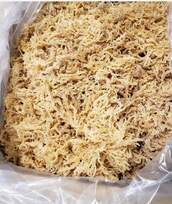 Sea Moss is amongst the worlds top superfoods, arguably the worlds #1 Superfood. Sea Moss has 92 out of the 102 vitamins + minerals your body needs to function wholly. Amongst the most popular ways to intake Sea Moss recently has become in its gel form. Sea Moss in its gel form can be easily mixed and dissolved into tea, soup, grits, baked goods, fruit juices/smoothies, etc. And thats just the beginning of what you can do with Sea Moss. Amongst what is found in sea moss includes: Amino Acids, Vitamins B1, B2, B12, Vitamins A, C, D, E, F, and K. Also, Calcium, Iron, Magnesium, Sulfur, Zinc, Potassium, and much more. Its benefits on the body and overall wellness include: Sustained energy, balanced metabolism, Nourished hair and skin, stronger bones and joints, increased muscle and tissue recovery, aids digestion, rids the body of excess mucus/phlegm, boost thyroid function, boost libido, anti-inflammation, oxygenates cells/anti aging, etc. This is what is known as the “All in One” method to sustainable health and wellness. Growing up with two Caribbean parents I have been taking Sea Moss since a toddler. I recently launched my Tru92 wellness company selling herbal infused sea moss gel bottles to encourage health and wellness within our community. Sea Moss is something that all of is should be adding to our diets immediately. Na’il Salahu-DinA Husband. An Educator. A Healer. and Sociologist. Na’il is a world traveler, having touched every continent except Antarctica. Na’il has been a dedicated student of knowledge for the pass decade under the mentorship of various Imam and Shayukh from New York and Atlanta to Senegal and Sudan. Na’il has been a supporter and facilitator of various cultural and interfaith initiatives specifically focused on holistic health and wellness, youth leadership, communal unity, divine masculinity, and character development according to prophetic tradition. He is currently a 2nd year student at Bayan Islamic Graduate School partnered with the nationally acclaimed Chicago Theological Seminary. Na’il is a community youth leader and an aspiring chaplain. A loving husband and father to his wife Anaya and their two children. Creatives Helping People is a non-profit organization that was Established in 2017 born out of the need to provide Interior Wellness to deserving families that are traditionally underrepresented and underserved. We are firm believers that Interior Design is more than the way a space looks, but how it makes you feel. The “feeling” of a space is what Interior Wellness is all about. We have found that families that have a space that is personalized, comfortable, aesthetically pleasing, and functional tend to have a better outlook on life. They are even able to be more productive and happier in their day to day. It is our mission to change Interior Design from being a want but a radical mental health need. Aidah JohnsonI am an interior designer that specializes in and advocates for Interior Wellness. I reside in Atlanta, GA with my husband and three kiddos. 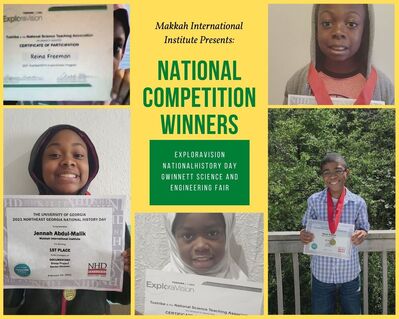 For the past few weeks, the students at Makkah International Institute have been working on the Exploravision, National History Day, and Science Fair Projects. Each grade level and every class has participated in the creation and perfection of their work to present in front of judges for evaluation. Every single individual project was based on a subject in those particular classes for example science classes did science related topics and ect. Both the Exploravision contest and the Science Fair, were science based projects while the National History Day was a historical research project. In physics, the students were asked to create a device or prototype of sorts that might aid in the treatment and or diagnosis of breast cancer, for the Exploravision project. The inspiration that grew from creation from this device led to it being submitted into the Science Fair Project as well by Jennah Abdul-Malik, tenth grade student at Makkah Institute, and I. The middle school students participated in the Green Roof Project for the Exploravision while the 4th/5th grade students worked on a soil erosion project The students overall did an excellent job at representing the muslim schooling community with their regional placements. The National History Day advancing students included; First place winners Salam Castor, Nazaha Bryant, Jennah Abdul-Malik with their documentary titled Uyghur Internment: A Lesson in Censorship, Romaris Baker in the junior division with his exhibition on the Stamp Act, Ameer Perkins, Nassir Khamis, Sahar Abdul-Mateen and Ibrahim Abdul-Malik with an exhibition about the Soldiers Propaganda during the Vietnam war, and lastly me, Christie Castor, in second place for the senior category for a paper about the legal repression of the African American people in the constitution. The students who are advancing in the science fair project includes; placing in third place, Jennah Abdul Malik and Christie Castor in the Biomedical Engineering; Middle schoolers Ibrahim Abdul-Malik and Ameer Perkins with their Environmental Engineering project and last but least Nassir Khamis and Khalil Bryant with a project dealing in Environmental Engineering as well. These students will be advancing into the state category of the competition, which essentially means they will be competing with more students over the state of georgia. We will be cheering on our students virtually as they hopefully continue to advance into great things! My personal experience regarding this competition is that it requires a lot of focus and dedication. The best way to personally achieve great things in terms of competitions is to put the best work that you and your group could possibly give out. My group personally, in regards to all our projects, we devoted a lot of time into thinking about the perfect solution to our problem. I would often observe as my other younger siblings would talk about their projects in class and I love seeing the dedication they put as children and teenagers, in important work that could possibly benefit the world in the best of ways. My team thought thoroughly about our topics and even actually debated its change but in the end we came to a decision that only benefitted us but gave us an edge. I cannot lie and say that it was not stressful having to watch as judges criticize the work that took almost a month to complete. Criticism is hard to take especially when everyone feels they put their best foot forward, with that being said, the placements that the students have in each contest shows that our effort is not going to waste. I think it is important to show the world that the students at Makkah Institute have the potential to achieve awesome things. Christie CastorMy name is Christie Castor, I am a student at Makkah Institute in the 12th grade. Though this is my first year enrolled in the Makkah International Institute, I am honored to be part of such dedicated group of muslim people who believe in the education and empowerment of young muslims. I am graduating this year in May, Inshallah, I hope I can take what I have learned from the Makkah Institute and into college with me. 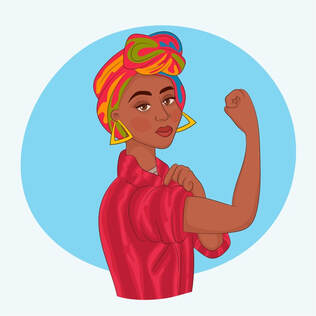 "FIRST THEY ignore you, then they laugh at you, then they fight you, then you win." These words of Nicholas Klein are often misattributed to Ghandi. But the misappropriation of one’s words are just one example of how the truth of things often becomes distorted. People believing something doesn't make it true. People ignoring you doesn't make you or your ideals irrelevant. People laughing at you doesn't make you incompetent. People fighting you doesn't make you worthy of being despised. Ultimately, the winning in all of the aforementioned is when the truth plainly and clearly shows itself and it can no longer be denied or resisted. The current truth I would like to deal with is the condition of those in the African Diaspora. The time for talking is past and action is the now the only alternative. There are many racial initiatives and programs going on these days and given my background in Anthropology, Philosophy, and Education, most people expect for me to be interested in or engaged with many of the seminars available on “race” right now especially those that are addressing the racism that exists in my religious group, the colorism among people in my tribe and other tribal levels of connection, and even the disparities on a larger community level that address the engagement of the "black" community with the modern day police force which has quite a complex history in this our United States of America. The main reason many will find me absent from discussions they might expect me to be present in, knowing full well how passionate I am about Afircan liberation across the entire Diaspora, is because I do not engage in conversations that ignore deeply examined, sensible premises in order to support conversations that can truly lead us forward. Educating our young people, ourselves, or even others outside of our cultural group about The African Diaspora experience must transcend above and beyond presenting information that begins at a historical view that only acknowledges Africans post European or post Arab contact. It is not sensible nor is it an honest approach to continue to pretend Africa was the “Dark Continent “ and nothing of value occurring there until outside contact. It is impossible to understand anything of any society in the Earth and not recognize the origin of organized society IS Africa. The first place for man to have a religious idea and expression for example to have the cognition and spiritual awareness to bury their dead happened in Africa first. The first Universities in the world exisited in Africa first and therefore were the first seats of Philosophical thought. Hippocrates, Socrates, and Plato all admitted that whatever knowledge they had they had garnered out of "Kemmet" (in Egypt) and brought it back to Greece, modified it, interpreted it and fit it to fit the back drop of the culture of Greco-Roman cultures. So when you want to talk to me about the plight of African people, understand that if you are not bringing me the whole story and with a clear lens through which not only to understand Africa of the past, present and future, I am unable to meet you where you stand. African culture and condition is much greater than a snippet of 700 years. I do not engage in conversations that merely talk about personalities and accomplishments of individuals without recognizing the long-term implications of long standing, vast kingdoms and their impact on the world and then subsequently them meeting their demise through a global phenomena that goes ignored constantly and therefore is the common and undeniable root and cause of the majority of the injustice and oppression currently in the world today. A true conversation about African liberation must address what happened and why and the part EVERYBODY has played in it because knowingly or unknowingly most everyone has had some involvement even if you have only been used unwittingly by the invisible hand of greedy and powerful governments. This is the age of information. Being educated is mostly a click away from any of us at anytime. If you are not a part of the solution, try not to be a part of the problem, and a big part of the problem is ignorance....being unaware. Many of the current seminars, initiatives. and series presented since the surge after the death of George Floyd have been beneficial to showcase certain public speakers, or met with glee by a staff (particularly in schools) who are required to spend a certain amount of dollars on professional developments yearly, and I'm sure plenty of money has been made. Bottom line, what has been accomplished in the knowledge gained that will be life changing for the people attending the seminar? What can professionals, especially teachers take away from it that teaches them to ASK THE RIGHT QUESTIONS of the right people and of the right time? The problem is and has always been that history repeats itself when not being accurately known or understood. There seems to be a wide and fearful disconnect when we look at world history and American history when it comes to dealing with our relationship to Africa. It's time to come out of the dark and realize, education frees, not shackles. I beleive we (Americans) are strong enough to look at our history, all of it--although it is complex and problematic. We can examine it in a realistic and wholistic way that allows us to analyze it and consider its implications for our current life and our futures. Don't be afraid to do just that. Our Universe is uni=one, verse =song. Don’t be afraid to sing along. Peace and blessings All. ONE LOVE Janice WestJanice West is an Islamic School educator as well as a relationship coach. She holds a degree in Anthropology from Wichita State university and is certified in Cognitive Behavioral Therapy. Janice lives with her family in Chicago, Illinois. “Communication between Mamas and their young adult sons can be a challenge, but it doesn't have to be. Join Jaasmeen Hamed and her son Nafees Hassan, a favorite in the Mama son duo crew every Monday and Friday where good conversation takes place and tools to improve the mother-son bond are shared. If you are a mother of a young man between the ages 13-26 in search of; conversation topics that are both culturally and socially relevant, tools to break the ice on sensitive subjects, or have an interest in connecting with other mother-son duos in need of convo tips, then this podcast is for you.” Jaasmeen HamedJaasmeen Hamed is a California Bay Area native and a lover of all things African & God friendly. She has a passion for research and project development internationally in the areas of architecture, religion, and international exchange. Jaasmeen is a volunteer with several organizations throughout Metro Atlanta that offer interfaith and at-risk youth services through programming for both high school and college-level students as well as other residents within Metro Atlanta. The owner of Spirit Foods LLC, a vegan and vegetarian specialty food provider, Jaasmeen is a health advocate and loves providing her customers with wholesome foods to enrich both their bodies and soul. She also works professionally as a Business Analyst and is the mother of one young adult man. 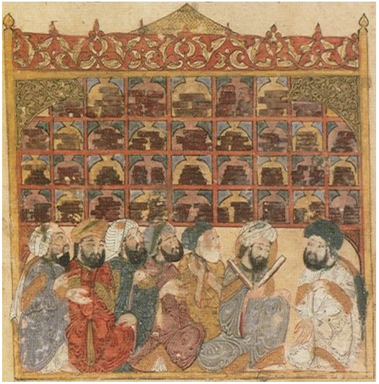 The Roots of Islamic Psychology …..”Ilm al nafs” Why do so many so-called “religious people” see mental illness as incongruous or contrary to faith? This is a question that must be addressed. These assumptions can be rooted in unjustified stigma and ignorance. Mental illness has existed in all times amongst all people. Psychology, the medical and philosophical study of the psych, soul or self, was recorded as early as 1550 BCE when depression was noted in the Ebers Papyrus. One of the earliest noted contributors was a Persian named Muhammad ibn Zakariya al Razi who was a physician, scientist and philosopher. He was noted for writing about mental illness and psychotherapy. His major works called El Mansuri and Al Hawi described many conditions as well as treatment options. He eventually became the first director of a mental health ward in a hospital. The first bimaristans or hospitals were built in Baghdad in the 9th century. Another Persian writer, Abu-Ali al Husayn ibn Abdalah Ibn Sina, more commonly known as Avicenna was a forerunner in the field of psychosomatic medicine. He demonstrated the link between changes in the mental state and changes in the body. Ali ibn Sahl Rabban Al Tabari wrote a work emphasizing the need for psychotherapy. In the 10th century, Ahmed ibn Sahl Al Bakhi stressed the link between spiritual and mental well being. By the 13th century separate wards were made available in the bimaristans for those suffering with mental disorders. These were a few of the pioneers in Islamic psychology that intersected with information of Greek origin within the learning center of Baghdad during the “Golden Age of Islam” from the 8th to the 14th centuries CE. The rest of the world was experiencing what was termed “The Dark Ages” or the “Middle Ages” which began after the decline of the Roman Empire. This was a period of cultural and economic deterioration that occurred in Western Europe. A group of scholars from China, India, Arabia and Ancient Greece exchanging mathematical, astronomical, philosophical, medical information in the learning center of Baghdad. Baghdad, which was centrally located between Europe and Asia, was a major trading spot where ideas were spread for the enhancement of civilization. References 1. Wikipedia contributors, “Timeline of psychology,” In Wikipedia, The Free Encyclopedia, 3 Oct. 2020. Web 2 December 2, 2020 2. Wikipedia contributors, ‘Psychology in medieval Islam’, Wikipedia, The Free Encyclopedia, 26 November 2020. Web 2 December 2020 3. Ayad, Dr. Amira, Healing Body and Soul, 2013, International Islamic Publishing House, Riyadh, Saudi Arabia Ameedah Diaab AbdullahAmeedah has been a mental health consumer for several years and has dedicated her lifework to improving mental health outcomes for others dealing with challenges. She has experience working directly with clients connecting them to services and teaching basic activities of daily living in New Jersey prior to moving to Atlanta. 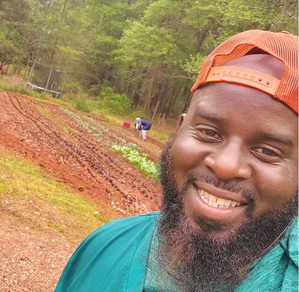 Bread and Butter Farms was officially established in 2013. As a family, we have been growing both collectively as well as on an individual basis throughout our lives. We are both science researchers by trade and at heart, so we treat farming as a science as well. We operate in ways that go against the norm for some people. For example, we plant in a bio-intensive manner which basically means we plant really close together, we make our own chemical-free pest control and offer prepared meals with our produce/meats. It is our passion and we share this with our children by exposing them to the humbling experience of farming. It is important to us to show them that the world of agriculture has many aspects that are not limited to growing. We have a strong respect for the land that we have been blessed to steward. Homeschooling allows us to pass this passion on, educate them in entrepreneurship, and exposes them to the multifaceted options available in the form of value-added products. These are products that you make from produce or animals you have on your farm (i.e. infused oil/vinegar, canning and preserving, goat milk soap, bread from grains, etc.). We offer a variety of products outside of produce available on our website, www.breadandbutterfarms.com. This enables us to provide our customers with a wide range of options and to reduce food waste. At its core Bread and Butter Farms is a family farm that is passionate about education, the environment, and serving our community. Come grow with us! Musa and Micole HasanMusa and Micole Hasan operation Bread and Butter Farms located in Monroe, GA. They run the 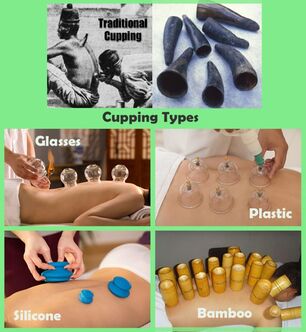 Cupping is an ancient remedy dating back to 1550 BC. The oldest medical book in the world The Ebers Papyrus describes the Egyptians’ use of hijamah (cupping). In China, the earliest description of horn method (using animal horn) was in book Fifty Two Diseases from Han dynasty (202 BC). Over 2000 years, Cupping has been part of Chinese medical practice, among which are acupuncture, Qigong, herbal and dietary therapy. Cupping helps all diseases through balancing Yin Yang and energy flow. From modern medical perspective, cupping increases blood circulation. This relieves muscle tension and promotes tissue repair. Cupping is made of bamboo, glass, ceramic, silicon and plastic. There are two main categories of practice today. Dry cupping is a suction-only method. Wet cupping involves both suction and controlled medicinal bleeding. Recent years, people are enthusiastic about cupping due to famous athletes and celebrities’ engagement. However, like any therapy, it should be careful if you have skin irritation, on blood thinner, pregnant or with some medical conditions. Side effects include dizziness, nausea, skin bruise and blister. Wet cupping leads to hepatitis and HIV if the cups are not sterilized. Please check the practitioner’s training before cupping therapy. Yu Kang, LAc, RD, LD, DipOMYu first began healing studies with her parents, who are well-known doctors of Oriental Medicine in her hometown Zibo -a mid-sized city in northern China. At the age of 15, she was accepted by Shandong University of Traditional Chinese Medicine as one of the youngest students in school history. After eight-year training in Western and Oriental Medicine, she graduated with a doctoral degree of oriental Medicine. Yu then went to China Academy of Traditional Chinese Medicine to be further trained in acupuncture and herbal medicine under the most influential doctors of Oriental Medicine in China. Prior to her arrival in the United States, Yu was a neurologist in Xiyuan Hospital, Beijing. Yu’s extensive training also includes a master’s degree in Nutrition from the Pennsylvania State University, and a one-year dietetic internship at the Beth Israel Deaconess Medical Center-a teaching hospital of Harvard Medical School. Yu is a licensed acupuncturist, a registered dietitian, and a certified herbalist from the National Certification Commission for Acupuncture and Oriental Medicine (NCCAOM). |
Don't miss another edition of A Message from Makkah. Click the button below to join our mailing list
Contact Us for Advertising Opportunities!
Archives
January 2023
Categories
All
Our Sponsors |
Makkah International Institute
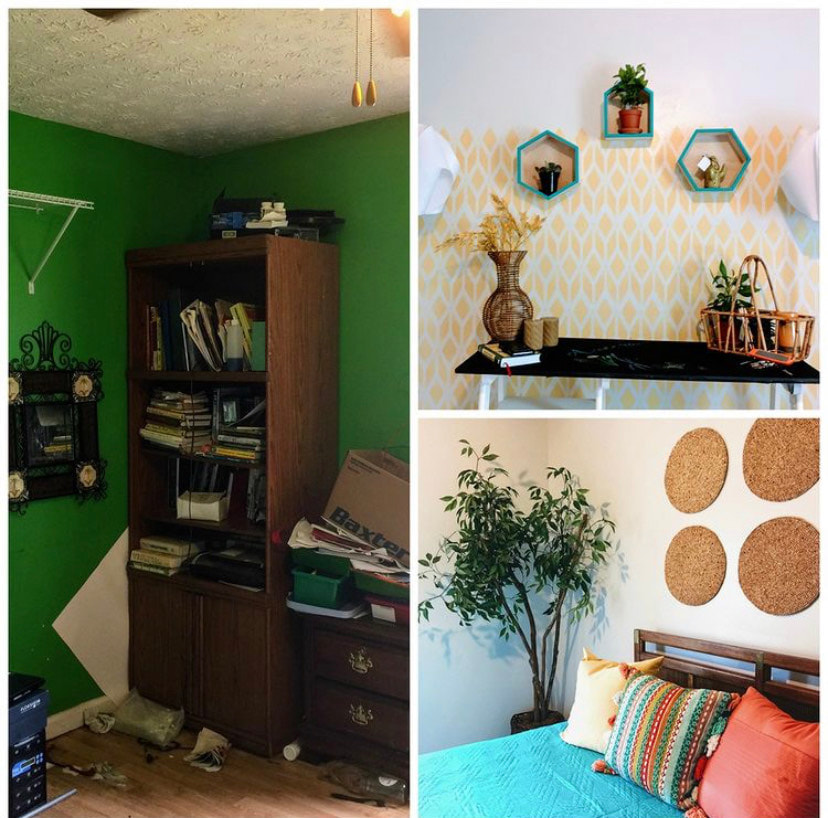
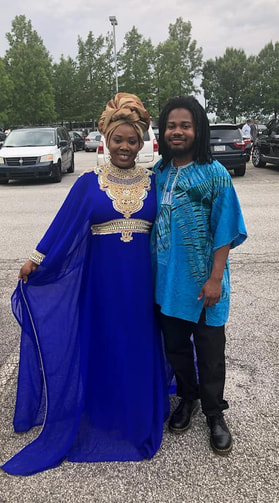
 RSS Feed
RSS Feed